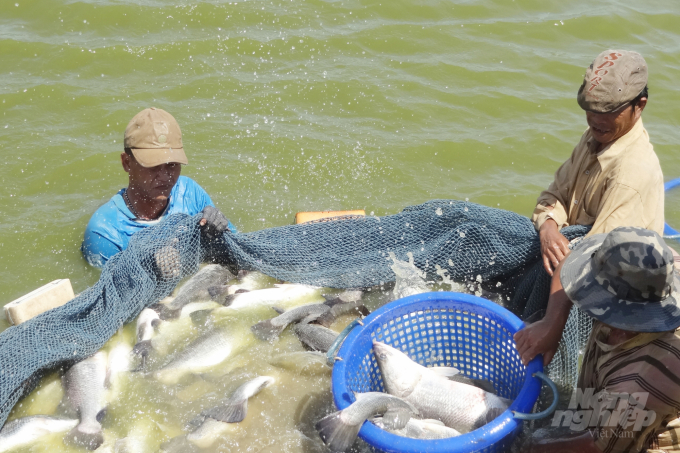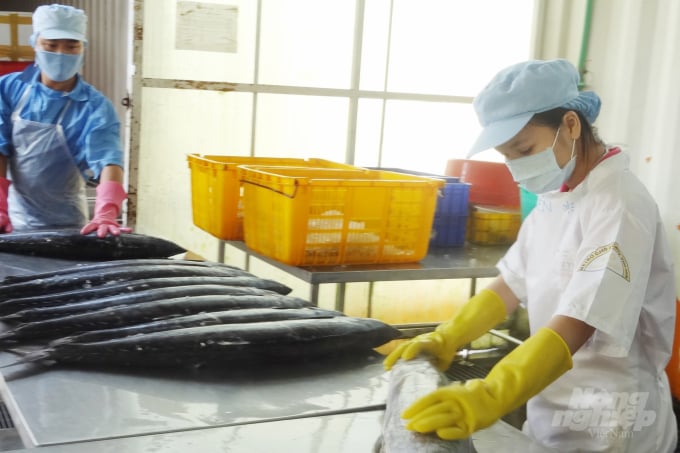May 30, 2025 | 04:58 GMT +7
May 30, 2025 | 04:58 GMT +7
Hotline: 0913.378.918
May 30, 2025 | 04:58 GMT +7
Hotline: 0913.378.918

Harvesting seafood in the Mekong Delta. Photo: Thanh Son.
According to Ms. Le Hang, Deputy Director of the Training and Trade Promotion Center under the Vietnam Association of Seafood Exporters and Producers (VASEP.PRO), seafood exports in October have recorded a very positive recovery as the export value of most products main products are once again on the rise.
This recovery has helped seafood exports in October reach an estimated USD 910 million, up 47% compared to September and almost equivalent to October 2020. More importantly, the return of seafood export growth shows that seafood production and export are gradually stabilizing and recovering clearly.
Thanks to the positive export results in October, Vietnam's seafood export in the first 10 months of this year reached an estimated USD 7.1 billion, a slight increase of 2.4% over the same period in 2020.
To be more specific:
Shrimp exports achieved USD 3.2 billion, up 2.6%;
Pangasius reached USD 1.2 billion, equivalent to the same period last year;
Tuna reached USD 598 million, up 10%;
Squid and octopus reached USD 475 million, up 4.5%;
Fishes of other types reached USD 1.36 billion USD, down nearly 1%;
Particularly, bivalve mollusks still maintained a high growth rate of 39% after 10 months, reaching 113 million USD.
The return of seafood export growth in October was largely thanks to the important markets. Seafood exports to the USA spectacularly recovered with a 31% growth rate. Exports to South Korea increased by 20%, 17% for exports to Canada, and 9% for exports to the EU. It is because these markets have shown such good growth that even though seafood exports to the Chinese market dropped sharply with a decrease rate of 43%, seafood exportation in October is still considered a positive recovery in general.
According to VASEP, demand from import markets remains high at present. Meanwhile the seafood processing and production industry is recovering and is expected to make a comeback in the last two months of the year when the vaccination rate in the Mekong Delta provinces has increased rapidly, limiting the impact of Covid-19 on seafood processing factories.
The Import-Export Department (Ministry of Industry and Trade) also believes that seafood exports will make a strong comeback in the fourth quarter of 2021 when the Covid-19 epidemic in Vietnam is under control on a fundamental level. This is the time for businesses to boost production to meet the year-end demand from import markets.
The seafood industry still has to face many difficulties and great challenges in the last two months of the year.
According to Ms. Le Hang, the big challenges for businesses are the lack of raw materials, labor, and capital. Maintaining production while conducting anti-epidemic measures has made enterprises unable to fully recover their capacity. Production costs (input costs, labor, transportation, equipment for disease prevention and production options in new conditions) also increased significantly.
VASEP has proposed to the Government, relevant ministries and sectors to drastically prevent illegal fishing activities in foreign waters, quickly remove the IUU yellow card in order to maintain and restore the EU market.

Vietnam is the leading seafood supplier of many major markets in the world. Photo: Son Trang.
VASEP also suggested localities pay attention to effectively implementing practical mechanisms and policies to support workers so that they can return to production activities without worries. Vaccination for fishermen and workers should be hastened in processing industrial zones as well as key fisheries production areas.
Vietnam is a major seafood supplier to many markets
Although seafood exportation had to face many difficulties due to the epidemic, Vietnam still maintains its position as a leading seafood supplier to many markets.
According to the International Trade Centre (ITC), in the first months of 2021, seafood imports of all kinds of 9/10 largest importing countries in the world increased compared to the same period in 2020. China's imports in particular experienced a slight drop.
The EU is the world's largest seafood import market, reaching USD 30.87 billion in the first seven months of 2021. Vietnam's seafood market share in the EU’s total imports was still at a stable rate (1.8%) compared to the same period in 2020.
The USA is the second largest seafood import market in the world, reaching USD 19 billion in the first eight months of 2021. Vietnam is the fifth largest seafood supplier to the USA and has the highest increase rate in market share among the top five seafood suppliers.
A recent report from Japan Customs also shows that Vietnam is the third largest seafood supplier to Japan in the first eight months of 2021 with a total volume of 92,071 tons, reaching USD 696 million.
According to the General Administration of Customs of China, in the first nine months of 2021, the country's seafood imports reached USD 9.7 billion, up 2.7% over the same period in 2020. Vietnam was the fifth largest seafood supplier to China during this period, accounting for 5.31% of China's total seafood import value.
Son Trang
Translated by Samuel Pham

(VAN) Ms. Nguyen Thi Dung, Deputy Director of Ngoc Hoang Cooperative, shared about the journey of bringing dragon fruit to Europe, achieving annual revenues in the billions of VND.

(VAN) Bamboo products from Thang Tho Bamboo Cooperative have reached many countries around the world, while also creating jobs for local workers.

(VAN) The Management Board of Con Dao National Park reported that a green sea turtle, tagged in the Philippines, has traveled thousands of kilometers to lay 84 eggs on Bay Canh Islet.

(VAN) Green technology is paving a new path for sustainable aquaculture in the Mekong Delta in particular and across the country in general, helping reduce emissions and adapt to climate change.

(VAN) On May 27, La French Tech Vietnam (the French startup and innovation community in Vietnam) held the French Tech Summit Vietnam 2025.
/2025/05/27/4731-2-223159_980.jpg)
(VAN) No votive paper, no styrofoam, no plastic bags, no plastic bottles, and no single-use plastic trays are the key rules tourists should keep in mind when visiting Con Dao.

(VAN) In the fight against plastic pollution, Vietnam has been demonstrating a proactive, pioneering, and active role in addressing the greatest environmental challenge today.